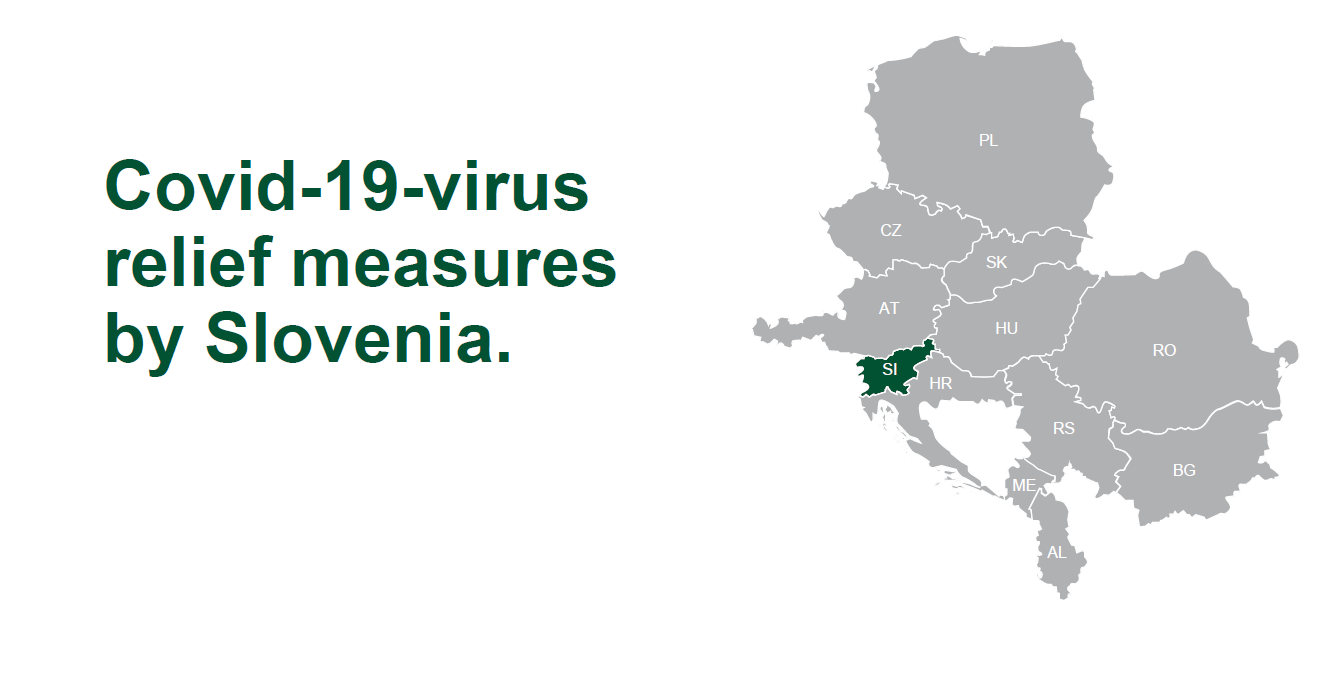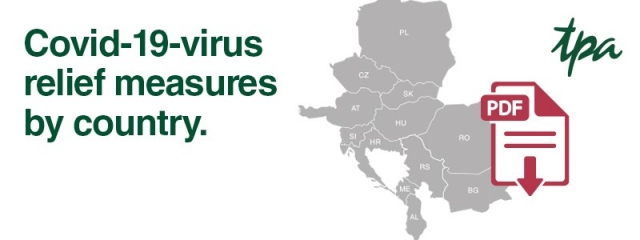
Update 25 May 2020
On March 20, 2020 several laws were passed in connection with the coronavirus (SARS-CoV-2) with the aim of economy support:
This includes:
- the law on measures in the field of salaries and social contributions (Measures Act)
- the Law on Public Financial Measures (tax law measures)
- the Measures Act on the Deferral of Borrowers’ Liabilities (Loan repayment measures).
On April 2, 2020, the Measure Act was passed in conjunction with the coronavirus (SARS-CoV-2). The Measures Act, hereinafter referred to as COVID 19 Law, was published in the Official Journal of the Republic of Slovenia and has been in force since April 11, 2020.
With the COVID 19-Act, the following previously adopted laws were changed:
- the law on measures in the field of salaries and social contributions (Measures Act)
- the Law on Public Financial Measures (tax law measures)
- the Measures Act on the Deferral of Borrowers’ Liabilities (Loan repayment measures).
In addition, numerous other provisions have been added. All in all, with regard to the accompanying tax measures, the employer privileges, which were originally rather poor, have now been significantly improved.
With the legal changes that came into force on May 1, 2020, numerous legal provisions in connection with the Measures Act of April 11, 2020 (COVID 19 Law) were changed, supplemented and, in some cases, doubts resolved. The changes and additions are based on the Law on Amendments and Additions to the Covid-19 Act (hereinafter referred to as the “Covid-19 Act NEW”).
Furthermore, the basis for government guarantees to secure the credit financing of companies was created by a legal framework. The legal basis for this is the law on securing additional liquidity for the economy to mitigate the consequences of the Covid 19 epidemic.
The main amendments and additions concern the following areas:
1. Short-time work in Slovenia and force majeure
For the Slovenian short-time work, thus the possibility to exempt employees from the obligation to perform work while receiving 80% of the monthly income, as well as the inability to perform work due to force majeure (quarantine, mandatory child care), the requirements for full coverage of personnel costs by the state budget (reimbursement) have been redefined.
COVID 19 Act NEW
The COVID 19 Act NEW now redefines a lower decline in sales as a prerequisite for the eligibility to apply for the reimbursement. The following employers are entitled to apply for reimbursement:
- employers whose sales have decreased by more than 10% compared to 2019.
- employers who were not active in 2019 are eligible if their average monthly turnover on an annual basis has decreased by more than 10% compared to the average monthly turnover between January 1, 2020 and March 12, 2020
- employers, insofar as there was no business activity throughout the entire year 2019 or 2020, if their average monthly turnover in 2020 decreased by more than 10% compared to the average monthly turnover in 2019.
Entitled employers must reimburse the reimbursement of costs if it turns out that the conditions were not met. It should be noted that the refunds due to childcare also count as sales.
The salary costs are fully covered by two measures:
- Direct payments of up to EUR 1,366.21 to the employer and
- Coverage of all social security contributions from short-time work from the state budget.
The amount limits have not changed. Gross salaries up to a gross salary of EUR 2,192.25 (gross limit) are eligible. If the gross salary is higher than the gross limit, the social security contributions, based on the amount exceeding the gross limit, are to be borne by the employer.
As part of the payroll, the employer only has to pre-finance the net salary and wage tax. Both will be reimbursed under the COVID-19 Act at the end of the month following the payment.
While work interruptions were only allowed up to 7 consecutive days per month until the original Covid-19 Act was changed, interruptions of up to 7 days per calendar month are now permitted by the Covid-19 Act NEW. It is now easier to meet the needs of the employer’s work processes.
In addition to meeting the formal requirements, companies that claim reimbursement of personnel costs for short-time work may
- not make any profit distributions in 2020,
- not make any profit distributions in subsequent years of retained profits of the period 2020,
- not acquire own shares or
- not pay the management any bonuses or success bonuses with tax benefits in 2020 or for 2020.
The above distribution restrictions do not apply to companies that claim to cover personnel costs due to force majeure. The same applies to the exemption from pension insurance contributions. Before the changes to the COVID 19 law, the restrictions also applied in the event of force majeure and when pension insurance contributions were claimed. If the above restrictions are not met, interest on arrears is payable from the time the claim is made until repayment.
If the formal requirements are not met, the tax authorities must be informed of this at the latest with the obligation to submit the tax return. A decision on the repayment will be made by notice.
The aforementioned benefits are only available to Slovenian employers after the last change in the law. Foreign employers are still excluded from the Covid 19 measures:
2. Guarantees of the Republic of Slovenia
the Republic of Slovenia is intended to ensure the necessary liquidity for companies by granting guarantees. Details are regulated by the law on ensuring additional liquidity for the economy to mitigate the consequences of the Covid 19 epidemic.
The Republic of Slovenia guarantees loans that meet the following factual requirements:
- Financing agreements completed between March 12, 2020 and December 31, 2020,
- maximum term of 5 years
- Financing of new or completion of existing investments, financing of current assets or repayment of loans that were agreed after March 12th, 2020 and meet the above requirements.
- No funding from affiliated companies or companies based abroad.
The maximum amount of the guarantee of the Republic of Slovenia for a company is 10% of turnover in 2019 and may not exceed the amount of personnel expenses in 2019.
The cost for the grant of a guarantee from the Republic of Slovenia depends on the size of the company and the term of the guarantee. The costs are between 25 and 200 basis points of the outstanding loan.
The following measures already adopted within the framework of the Measures Act (COVID 19 Act) remain in effect:
3. Other tax law measures
Numerous provisions have been changed or supplemented as part of the tax law measures. The most important are:
Extension of deadlines
The extension of the deadline for filing income tax and corporation tax returns by May 31, 2020 has already been decided by the Corona Measures Act. Likewise, the simplified applications for tax deferrals and installment payments have already been decided. In the case of different business years, it should be noted that there is no automatic extension of the deadline by two months. If the declarations had to be submitted before May 31, 2020 for a different fiscal year, they must also be submitted by May 31, 2020 at the latest.
Payment facilities
In connection with tax payment relief applications, a decision has to be made by the tax office within 8 days. Consequences of default only do not arise if there is a positive decision on the applied payment relief by the tax office when the payment is due. Prerequisite for applying for the payment relief is the loss of the ability to generate income due to the pandemic period. Industries in which the Corona crisis had no impact on sales will therefore not be able to rely on the payment relief provided by the Measures Act. Please note that at the time of applying for a tax payment relief the mentioned prerequisite must be proved and attached to the application.
No default interest is charged for deferrals and installments;
Tax executions
No tax executions are currently being carried out. However, it should be noted that, for example, when applying for short-time work, no tax liabilities of more than EUR 50.00 may exist.
Bankruptcy law
During the Corona crisis, there are basically no immediate obligations for applications for bankruptcy and there is no need to take any legally required actions. However, it should be noted that there is an irrefutable insolvency if net wages are not paid as part of the short-time work within one month after receipt of the reimbursement amount.
4. Loan liabilities
Deferrals of payments under the loan repayment measures can (among others) be applied by companies that are part of the law on business companies (e.g. d.o.o., d.d.)
Slovenian sole traders and also natural persons with their main residence in Slovenia. The application for deferred payment must be made within 6 months after the virus epidemic ended.
When applying, a distinction is made between large companies and other applicants. Large companies are companies with sales of over EUR 40 million, total assets of over EUR 20 million
and with more than 250 employees. It is sufficient if two of the just mentioned criteria are met.
Large companies have to explain that
- they pay taxes and social security contributions and – due to the consequences of the Corona virus – cannot guarantee the fulfillment of the loan agreement and the risk by paying increases the danger of falling into liquidity problems and thus the risk of solvency of the company would be higher.
- tax liabilities due on December 31, 2019 were paid or
- they are entitled to deferral or payment in installments of taxes and social security contributions at the time of application
Other applicants must declare that
- they pay taxes and social security contributions but due to the consequences of the corona virus they cannot ensure payment of the credit installments and
- all due tax liabilities were paid as of December 31, 2019 or that
- they are entitled to deferral or payment in installments of taxes and social security contributions at the time of application
While for large companies the prerequisite for deferring payment is that they are threatened to slip into bankruptcy, for all other applicants it is sufficient that they are unable to meet the payment obligations.
The deferral of payments based on the loan repayment measures is at 12 months limited.
Compliance with this law is enforced by the market regulator as a control body and through high penalties ensured.
Stay healthy!
Interactive PDF with all COVID-19 measures by country:
The governments of different countries have decided on immediate actions to moderate the impact of the Covid-19 pandemic on their national economy. Our local experts from CEE/SEE present the details of the COVID-19 virus relief measures by 12 countries.

